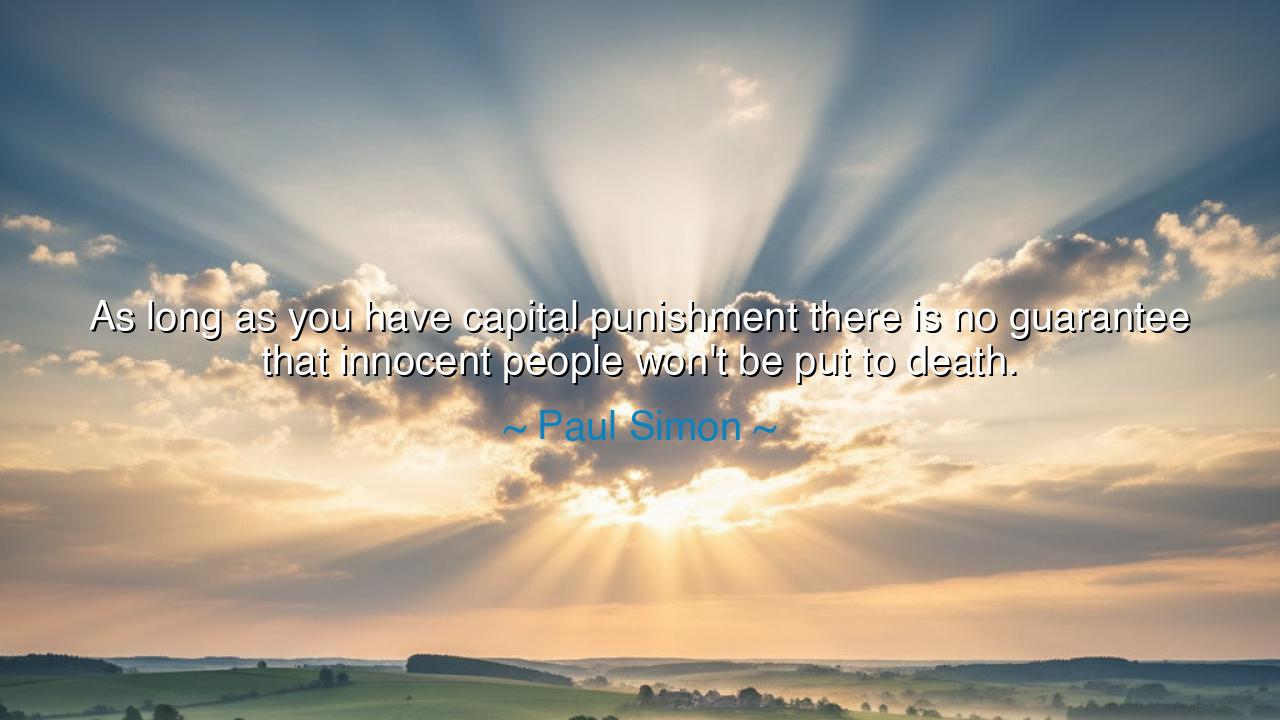
As long as you have capital punishment there is no guarantee that
As long as you have capital punishment there is no guarantee that innocent people won't be put to death.






“As long as you have capital punishment there is no guarantee that innocent people won't be put to death.” – Paul Simon
There are truths that pierce through the ages like a blade of light through shadow. This saying by Paul Simon, though born in a modern age, echoes the eternal wisdom of justice itself. It speaks not only of law and crime, but of the sacredness of life—the understanding that once a man is slain by the hand of the state, no power on earth can call him back. In these words lies both compassion and warning: that in the quest to punish evil, humanity must not become blind to its own fallibility. For the sword of justice, once drawn without humility, becomes the sword of tyranny.
Capital punishment—the death penalty—has been mankind’s oldest weapon against wrongdoing. From the tablets of ancient kings to the courts of modern nations, rulers have believed that death could preserve order and cleanse sin. Yet Simon’s wisdom rises from the ruins of that faith. He reminds us that the machinery of judgment is made not of gods, but of men—and men err. Men are swayed by pride, prejudice, fear, and ignorance. Thus, as long as the death sentence exists, the innocent stand among the condemned, and the promise of justice trembles before the possibility of error.
History bears witness to this tragedy. In the year 1915, two men in the United States—Nicola Sacco and Bartolomeo Vanzetti, poor Italian immigrants—were tried and executed for crimes that evidence could not firmly prove. Decades later, even their accusers confessed to uncertainty. Their names became a lament for justice undone. The world watched as the light of truth arrived too late, and their deaths became a shadow that stretched across generations. Such stories are not rare—they are the wounds that never heal, the whispers of the innocent who died believing in the fairness of a system that failed them.
And what, then, is the deeper wisdom within Simon’s words? It is that justice must be tempered with mercy, and that no human institution is infallible enough to decide the final fate of another’s soul. When we kill in the name of righteousness, we gamble not only with the life of the accused, but with the moral integrity of the society itself. For every wrongful execution stains the very ideal it seeks to uphold. To take a life unjustly is not mere error—it is the transformation of justice into murder.
There is a saying among the ancients: “It is better that a hundred guilty men go free than one innocent man be condemned.” Such wisdom is born not of softness, but of reverence—for life, for truth, for the divine mystery that dwells within every human being. The true strength of a civilization is not measured by the swiftness of its punishment, but by its patience in seeking truth. The greater the power to destroy, the greater the need for restraint. Capital punishment, when wielded without this understanding, becomes a mirror of vengeance, not justice.
Look to the story of Jesus of Nazareth, condemned by law, betrayed by fear, executed by those who claimed to defend order. In his death, the world saw the greatest miscarriage of justice—the execution of innocence itself. And through that tragedy, humanity was taught that even divine truth can be silenced by flawed judgment. Simon’s warning carries this same echo: that until all men are pure in wisdom and without bias—which they never shall be—the death penalty will forever risk the blood of the blameless.
O seekers of righteousness, take this teaching to heart: the power to end life must never rest easily in the hands of mortals. The voice of the law must always be softened by the heart of compassion. Where vengeance cries for death, let wisdom demand patience. Where hatred calls for blood, let mercy remind us of our own fragility. For justice that kills in haste may one day kill its own truth.
The lesson is this: build a justice that restores, not one that destroys. If punishment must exist, let it serve to heal, not to silence. Remember always that a single wrongful death is a wound upon the conscience of the world. Let every generation vow anew to seek truth with humility and to guard life with reverence. For in doing so, we honor not only the innocent who were lost, but the divine spark that dwells within every soul.






AAdministratorAdministrator
Welcome, honored guests. Please leave a comment, we will respond soon